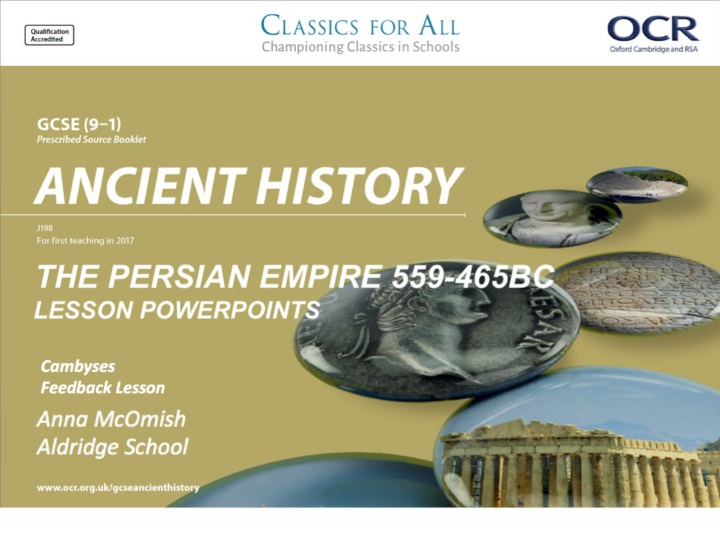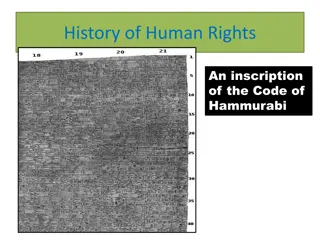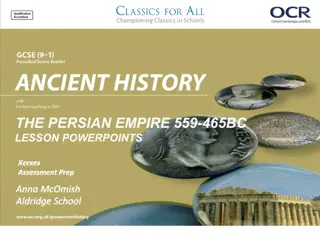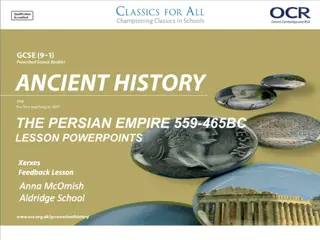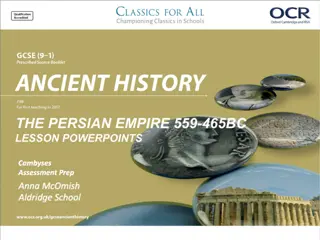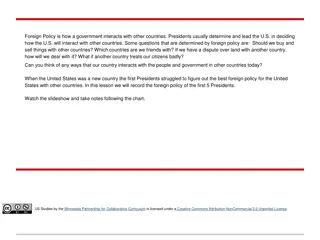Comparing Cambyses and Cyrus: Foreign Policy Perspectives
Explore the contrasting foreign policy approaches of Cambyses and Cyrus, focusing on their views towards foreign peoples, religion, and leadership. Analyze historical evidence to uncover the differences in their treatment of conquered territories and cultures. Evaluate the reliability issues surrounding Cambyses' reign to determine the impact on his policies and legacy.
Download Presentation

Please find below an Image/Link to download the presentation.
The content on the website is provided AS IS for your information and personal use only. It may not be sold, licensed, or shared on other websites without obtaining consent from the author.If you encounter any issues during the download, it is possible that the publisher has removed the file from their server.
You are allowed to download the files provided on this website for personal or commercial use, subject to the condition that they are used lawfully. All files are the property of their respective owners.
The content on the website is provided AS IS for your information and personal use only. It may not be sold, licensed, or shared on other websites without obtaining consent from the author.
E N D
Presentation Transcript
Cambyses Feedback Lesson
Persian Kings; Cambyses Assessment Follow Up L.O. to assess areas of weakness in assessments, and improve on these.
10 marker - Using details from Passage A and your own knowledge, what can we learn about the nature of Cambyses as King?(10) How many of the ticks did you answer achieve? What are the areas you need to keep working on? Areas to keep working on! What was I really happy to see! Use your own knowledge, to give historical examples from other times Cambyses demonstrated similar behaviour to the point you re making. Lots of people making points about Cambyses being a disrespectful king. Lots of people making points about Cambyses being a cruel king. Be more specific about what we can learn about Cambyses nature, so that you don t repeat your ideas. A sacrilegious king, for both Egyptian AND Persian religion A good military leader, as he d clearly won battles! Include quotes for each point you make. Accurate quotes, where it was explained HOW they prove the point. Make sure that your response sticks close to the angle/ topic of the question .e.g. the NATURE of Cambyses, not just general stuff.
15 Marker - 4. Using details from Passage A and your own knowledge, how different was Cambyses policy towards foreign peoples from that of Cyrus? (15) How many of these 5 expectations did you achieve? What did I expect to read? If you missed some, why do you think that was? A point discussing whether both were respectful of other people s religions. A point discussing whether both were respectful of foreign leaders. A point discussing the treatment of peoples once they were within the empire. TASK: read the example answer to this question. It s NOT perfect, but it is a really good effort. A quote for at least 2 of the points of discussion 1. Underline/ highlight where any of the 6 ticks are achieved in the answer. 2. Underline/ highlight where each paragraph links back to the question. 3. Write down one way in which this answer could be improved. A conclusion as to whether the two kings policies were more similar, or different. BONUS POINT issues of reliability surrounding Cambyses.
4. Using details from Passage A and your own knowledge, how different was Cambyses policy towards foreign peoples from that of Cyrus? (15) I would argue that Cambyses policies towards foreign peoples was different to Cyrus . The first point to consider is that Cambyses unlike his father was disrespectful to the people. In passage A, Cambyses is shown being disrespectful to the Persian God which was Fire. This is shown in the quote this was an unholy thing to do because Persians believed that Fire was a God and never burned their dead . He also killed the Apis bull (Patar in bull form) and mocked the bull for bleeding. This is different to his father Cyrus who linked and respected the Gods of the countries which he took over. This is shown when Cyrus linked himself to Marduk a Babylonian God. This proves that Cambyses policies were different. The second point to consider is that Cambyses didn't respect the rulers of the countries he invaded, this is shown in passage A where it says treated with every possible indignity . Cambyses desecrated Amasis' body, he whipped his body and pulled out all of his hair. This shows Cambyses didn't treat other kings as equals or respect them, whereas Cyrus kept Croesus the king of Lydia alive and as a close adviser, and respected his opinion. This proves that Cambyses policies were different to Cyrus policies. Although there were debates whether the reliability of the sources Herodotus used were biased against Cambyses. His sources could have been priests who were banished or had their taxes removed from temples which they worked in. A source who spoke highly about Cambyses was Udjahorresnet, an Egyptian priest, who converted to Cambyses side during the war. He said that Cambyses removed corruption from the law and he lead the Apis bull s funeral as Pharaoh of Upper Egypt and Lower Egypt, which was a great honour, which could say that his policies were the same as Cyrus . In conclusion, I believe that Cambyses policies were different to Cyrus because he
15 Marker - 4. Using details from Passage A and your own knowledge, how different was Cambyses policy towards foreign peoples from that of Cyrus? (15) How can I make sure it s not just another 10marker answer? How can I improve my 15 marker? Ask yourself these 4 question, if the answer to any is NO, it s something your response needs to improve upon! Remember, with a 15marker, you're answering a question, not giving a summary. 1. Are there links between the different points your making, that you could identify and explain to make your response look more like a focused answer? 2. Do you link back to the question at the end of each paragraph, making it clear that you're always looking to answer the question? 3. Does the language you use to start each make it feel like a continuous answer, or does each paragraph feel like a stand alone? 4. Do you come to a conclusion at the end, that makes it clear which is the factors you said is the best example of difference/the most important impact/ the most significant event, etc? Try to write an response that continuously focuses on answering that specific question. Could be on similarities/differences, changes over time, impacts/consequences, causes of an event, the significance of an event or person.
